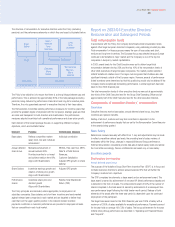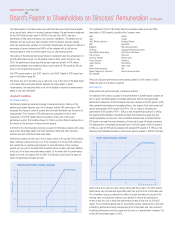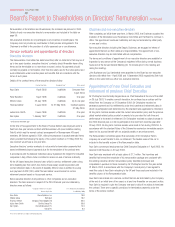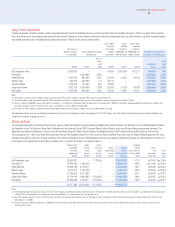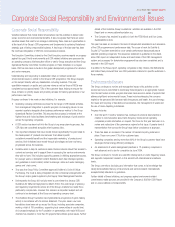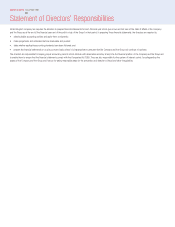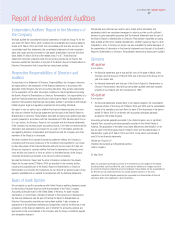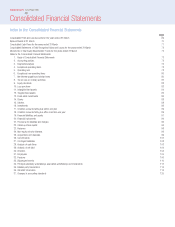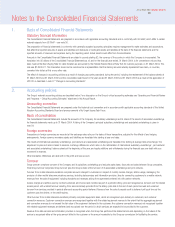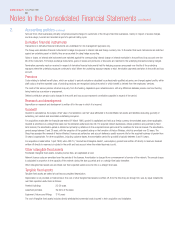Vodafone 2004 Annual Report Download - page 67
Download and view the complete annual report
Please find page 67 of the 2004 Vodafone annual report below. You can navigate through the pages in the report by either clicking on the pages listed below, or by using the keyword search tool below to find specific information within the annual report.
Corporate Social Responsibility
Vodafone believes that mobile telecommunications has the potential to deliver wide
social, economic and environmental benefits. It also recognises that there are some
sensitive issues that need to be managed. Addressing these risks and opportunities is
at the heart of the Group’s CSR programme and fundamental to achieving Vodafone’s
strategic goal of being a responsible business. A key focus of the last year has been
the continued integration of CSR into core business processes.
The Executive Committee, chaired by the Chief Executive, receives reports on progress
against the goal. Priority environmental and CSR-related initiatives are sponsored by
an operating company chief executive officer or senior Group executive and the Group
Operational Review Committee monitors progress on these initiatives on a regular
basis. CSR has also been included in the global development programme for directors
and senior managers.
Understanding and responding to stakeholder views on relevant social and
environmental issues is central to the Group’s CSR programme. The Group engages
on this subject directly with key stakeholders, including investors. This year,
quantitative research on public and customer views as well as those of NGOs was
completed across approximately 75% of the customer base, helping to ensure the
focus remains on priority issues and providing a basis for tracking perceptions of our
performance over time.
Progress continues to be made on key initiatives. For example:
•Operating company performance across the full range of CSR related activities,
from management integration to specific progress on managing issues, is now
reported quarterly alongside other business performance metrics to the Group
Operational Review Committee. This ensures that progress is reviewed at the
highest level and it also facilitates benchmarking and exchange of good practice
across the operating companies.
•A CSR section has been built into the Group’s long range planning process. Key
CSR risks are considered alongside other business risks.
•Two important initiatives that have moved forward significantly this year relate to
the development of ‘products and services’ that deliver specific
social/environmental benefit and the ‘responsible marketing’ of products and
services. Both initiatives have moved through pilot stages and are now being
progressed across the business.
•Vodafone aims to help its customers make informed choices about their access to
content and services and to support them in accessing the service environments
they wish to have. This includes supporting parents in defining appropriate access
for younger users. A dedicated Content Standards team has developed policies
and guidelines on adult content, instant messenger, video and audio messaging,
games and ‘chat rooms’.
•This year, the Group Policy Committee approved Vodafone’s Code of Ethical
Purchasing. The Code is being integrated into the commercial arrangements with
the Group’s major global suppliers by the Supply Chain Management function.
•Unfortunately, the Group did not fully meet its commitment to develop CSR
Guidelines for Network Deployment by March 2004. The wide range of planning
and regulatory requirements across all of the Group’s markets has made this a
particularly complex task. However, this remains an important subject and will
continue to be developed at the Group and operating company level.
•The Vodafone Group Foundation has implemented a programme of grant making
activity in accordance with its mission statement. This year, seven new local
foundations have been set up across the Group, including associate companies,
making a total of 19 foundations, supporting local communities at country level.
An increased emphasis by the Foundation on partnerships with major NGOs and
charities has resulted in more than 26 projects that address global issues. Further
details of the Vodafone Group Foundations’ activities are available in the CSR
Report and on www.vodafonefoundation.org.
•The Company has retained its position in both the FTSE4Good and Dow Jones
Sustainability Indices.
This year has seen an increase in the level of independent assessment and assurance
of the CSR programme and performance data. The scope of work for Deloitte &
Touche LLP has been extended to cover certain performance data procedures at
selected operating companies. The assurance statement is published in the stand-
alone CSR report. An independent review and benchmark of the CSR management
system and processes for stakeholder engagement has also been completed and is
reported in the CSR report.
In addition to the Group report, operating companies in Italy, Greece, the Netherlands
and Ireland have produced their own CSR publications tailored to specific audiences in
those markets.
Environmental Issues
The Group continues to monitor and manage the impact of its activities on the
environment and is committed to minimising these impacts in an appropriate manner.
Over the last twelve months, progress has been made across a series of projects that
address significant environmental issues. These include addressing the concerns
related to the perceived link between radio frequencies and health, the use of energy,
the reuse and recycling of handsets and accessories, the management of waste and
the use of ozone depleting substances.
Progress includes:
•Over the last 12 months, Vodafone has continued to promote best practice in
relation to communication about radio frequency levels and all operating
companies provide information on request. The focus for this year has been on a
review and restructure of the governance regime for this issue. A greater level of
representation from across the Group helps deliver consistency in approach.
•There has been an increase in the number of handset recycling schemes in
place. These now cover 97% of the customer base.
•Operating companies serving more than 90% of the Group’s customer base have
developed formal energy efficiency strategies.
•An assessment of waste management practices in 12 operating companies is
well advanced and is due for completion by June 2004.
The Group continues to monitor any scientific developments on radio frequency issues
and supports independent research in this area at both international and national
levels.
The Group commits to disclosing any information that comes to its knowledge that
clearly demonstrates that any of its products and services breach internationally
accepted safety standards or guidelines.
Further details of these initiatives, and progress against environment-related
commitments made last year, are provided in the Company’s 2003/04 CSR Report
and on www.vodafone.com/responsiblity.
Annual Report 2004 Vodafone Group Plc
65
Corporate Social Responsibility and Environmental Issues


